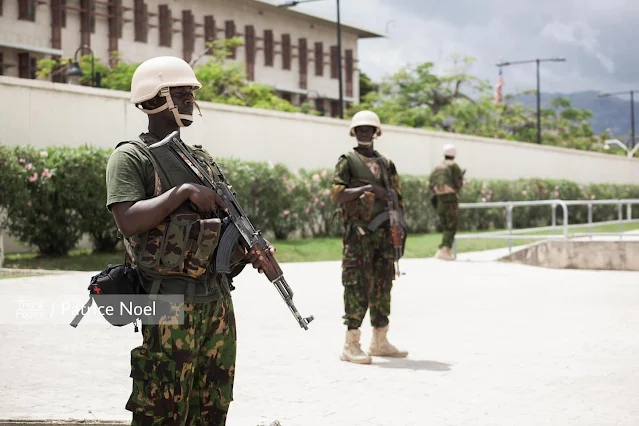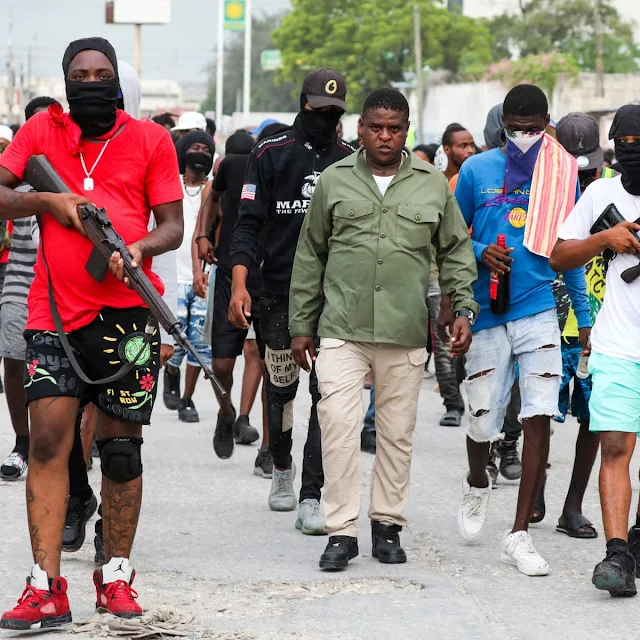
The recent deployment of Kenyan police officers to Haiti has stirred significant controversy, particularly after images emerged showing them guarding the US Embassy in Tabarre on America's Independence Day.
This has led to a public outcry, with many questioning the true purpose of Kenya's involvement in Haiti's peacekeeping mission.
Let's take an in-depth look at the situation in Haiti, the role of Kenya Police, and the ensuing debates surrounding their deployment.
Haiti's Call for ReinforcementsOn Saturday 6 July, Inspector General (IG) of Police Japhet Koome announced that Haiti had requested additional Kenyan police officers to be deployed to the Caribbean nation. The request, made by Haitian Prime Minister Garry Conille during a security briefing to the United Nations Security Council, underscores the critical situation in Haiti.The Caribbean nation has been grappling with escalating gang violence, a problem that has overwhelmed local law enforcement and left large swathes of the country under gang control.
Kenya has already trained 400 officers for this mission, with 200 already on the ground in Haiti since 24 June. The remaining officers are on standby, ready for deployment should the request be approved.
The Role of Kenya Police in Haiti
Kenyan police officers in Haiti have embarked on a comprehensive mission involving joint operational, logistical, and induction training with their Haitian National Police counterparts. Their mandate includes patrolling key areas, maintaining security, and engaging in strategic operations to curb gang violence.
In response to the backlash, IG Koome clarified that the Kenyan officers were not stationed at the embassy to provide security but were there for a meeting to discuss logistical issues and to receive new equipment sent by the US. The presence of ten commandos at the embassy was necessary due to the heightened security threats in the area. Nevertheless, this explanation has done little to quell public discontent.
Many Kenyans feel that their police force is being used as a private security service for foreign interests rather than addressing pressing security concerns at home.
Financial and Logistical Challenges
The peacekeeping mission in Haiti has faced significant financial hurdles. The United Nations Security Council has raised less than KSh 3 billion through its Trust Fund, falling short of the KSh 12 billion target needed to support the mission.
Maria Isabel Salvador, the Special Representative of the Secretary-General and Head of the UN Integrated Office in Haiti, has urged the international community to make financial contributions to ensure the mission's success.
Barbecue's Call for DialogueAmidst the turmoil, a surprising development emerged on Friday when dreaded gang leader Jimmy "Barbecue" Chérizier announced his willingness to lay down arms and initiate a national dialogue to restore peace.
Moving Forward
Despite the controversies, the Kenyan police in Haiti remain committed to their mission. IG Koome emphasised the importance of supporting the deployed officers as they work to restore peace in Haiti. The Kenyan contingent, which includes teams from the Rapid Deployment Unit, Anti-Stock Theft Unit, General Service Unit, and Border Patrol Unit, is well-trained and equipped to handle the challenges on the ground.
As the situation in Haiti continues to evolve, it is crucial for all involved parties to remain focussed on the ultimate goal of peace and stability. The international community must step up its financial and logistical support to ensure the success of the Multinational Security Support Mission.Meanwhile, Kenya must balance its international commitments with its domestic security needs, addressing the concerns of its citizens and ensuring that its police force is not seen as a tool of foreign interests.
Moving forward, transparent communication, adequate funding, and a focus on both local and international security needs will be essential in navigating this delicate situation.









.jpeg)
.jpeg)
.jpeg)



Comments